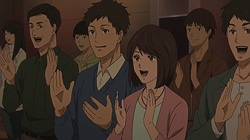 |
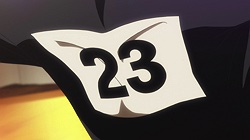 |
 |
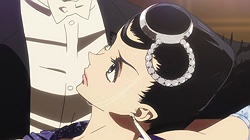 |
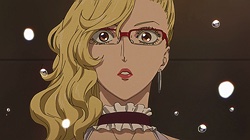 |
 |
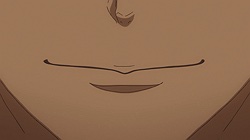 |
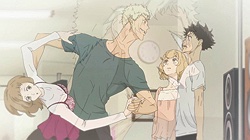 |
 |
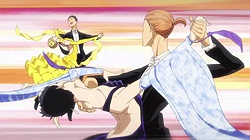 |
 |
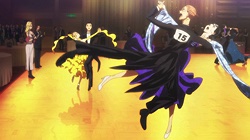 |
 |
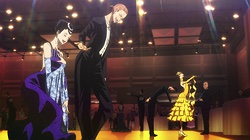 |
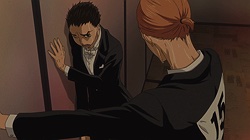 |
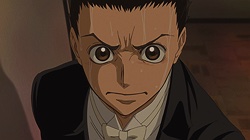 |
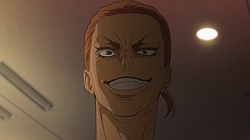 |
 |
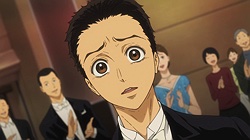 |
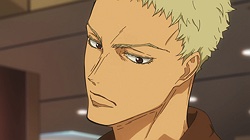 |
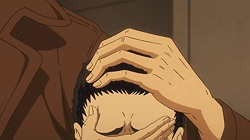 |
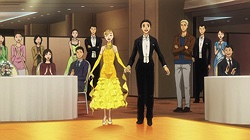 |
 |
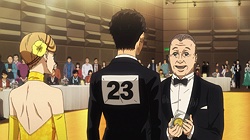 |
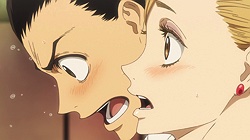 |
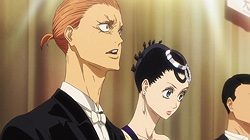 |
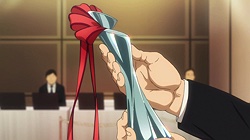 |
 |
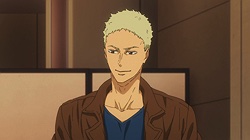 |
 |
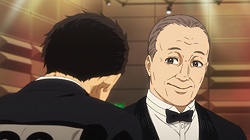 |
 |
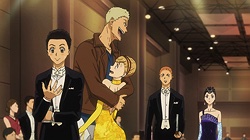 |
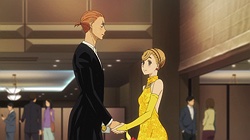 |
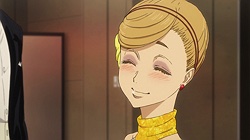 |
 |
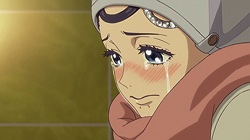 |
 |
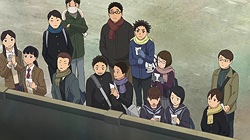 |
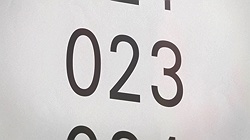 |
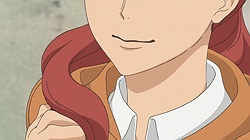 |
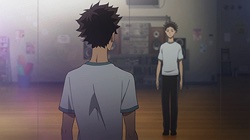 |
「評価」 (Hyouka)
“Final Evaluation”
The first cour of Ballroom e Youkoso isn’t officially over until next week, but that felt very much like a transitional episode. In fact it would have served very well as a series finale. And that’s very much what it felt like – one of those final episodes for one-cour adaptations of ongoing manga, where they’re going to leave you hanging in the story but want to try and achieve some sort of closure. But happily we’ve got another cour on the way (and probably more after that, eventually) which makes it possible to appreciate on a different level the sense of finality this episode was able to achieve.
The mixed reaction this show has received is not altogether surprising to me, given that my own feelings about it were somewhat mixed, at least at first. But I’m wrapped up enough in the characters now that it’s almost all good as far as I’m concerned, even if I have to stipulate to more than I normally would with shows I really like. Yes, the dance animation is not especially expansive – it seems Production I.G. has taken a very different approach here than, say, MAPPA did with Yuri on Ice. But you know, that show paid a pretty heavy price for that – the budgetary and scheduling issues were inescapable in the second half, and that series only had to budget for 12 episodes, not 24.
Another stipulation is that no, I don’t really understand yet what makes a great dancer different from a good dancer, and what makes a good partner. I continue to find a lot in common between this series and Haikyuu!!, perhaps most importantly that they elicit much the same feelings in me. They can be clumsy and awkward in terms of storytelling at times, but both have an infectious charm and relentless energy I can’t resist. Haikyuu!! is a gorgeously-animated show and I kind of get volleyball now, true – but isn’t it possible that ballroom dance is simply a more difficult subject for anime than volleyball? That it’s harder to capture the essence and subtlety of it in motion, and that its competitive nuances are much more inscrutable? I suspect that’s very much the case, though some will no doubt accuse me of making excuses for Ballroom.
I think Tatara is very much the right lead for his series, much as Hinata from Haikyuu!! and Onoda from Yowamushi Pedal are, because they embody the qualities that make the series work. Tatara isn’t slick or polished, but he’s relentless and likeable. Even when his legs give out (who knew you could tell so much from a wrinkled number?) he keeps fighting. Clearly he’s not on the same level as Gaju, or any of the other leaders in the final round. But the ineffable qualities he possesses are still apparent to the audience, even if only the ones directly in front of him at any moment.
Most importantly, perhaps, is that Tatara is someone willing to leave everything in the ring even when he’s fighting for someone else. This is all about Mako-chan for him – that’s the reason why she shone so brightly that his own skill as a leader was called into question. When the names are called after the quickstep, there’s never really any question that Gaju and Shizuku are going to win – they won both the audience (half of it, at least) and the technical battle. But it’s still an emotional moment, especially when Sengoku show a unicorn moment of kindness in consoling Tatara after it becomes clear the chibis aren’t getting anywhere near the podium. Even making the finals is a huge accomplishment, and it’s nice to see Sengoku acknowledge that – but as Tatara says, when those moments of connection with the audience come it’s hard not to dream that you might just pull off a miracle.
In a sense, Tatara and Mako actually do pull off a miracle, though it’s a bit naughty for Ballroom to only tell us now (unless you count Kiyoharu’s hint) that a special “Queen of the Ballroom” award is presented at the non-sanctioned Tenpei Cup. It’s a big deal emotionally for all four principals (Shizkuku’s secret tears bear this out) when Mako wins this, but of course it’s also huge in terms of the plot – because a literal reading pretty much says that means Tatara and Mako won their bet with Gaju and Shizuku. There can be no doubt now – this is serious for Tatara-kun, and he’s got a chance to be damn good at it.
What all this means for the main cast it, as ever, complicated. I think it would be hard to argue that Mako didn’t have by far her best performance with Tatara as her partner, or that the two of them don’t have great chemistry on and off the dance floor – they’re a good match. And I’ve already stated my skepticism that siblings can be top-shelf dance partners, though I suspect Gaju will treat his sister with more personal and professional respect now (Tatara has thrown down that gauntlet). But fate still seems to tie Tatara and Shizuku together, and as ever we have that stubborn math problem when Kiyoharu-kun recovers and starts dancing again. Perhaps we have a hint at the eventual solution here, though anyone who’d glanced at the cast list suspected such a development. There’s a real sense that the story is just getting started with Ballroom e Youkoso, and I’m looking forward to seeing where the second cour takes it.
Preview
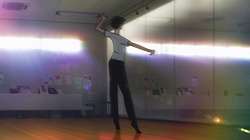 |
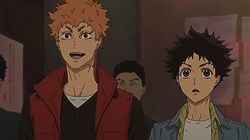 |
 |

This episode explains what a good dance is all about, when the old judge says: “Ah, I see. This is what I really wanted to see. The excitement that is only felt directly to those in front of them. A momentary, instant appeal. This is what excites. What mesmerizes. He is just dancing based on his emotions right now.”
And then Sengoku says: “A good final always makes the crowd clap to the beat in the Quickstep. That’s not because they’re getting into the music, nor are they cheering the dancers. It’s because the dancer’s emotions are contagious!”
And to finish it, Sengoku says: “I wanna dance!”
And that right there is when you know you’re seeing a good dance. One that simply makes you want to dance.
I’ve never thought of competitive dancing in a good way. Always thought it to be too robotic, too fake (the whole 1, 2, 3… 1, 2 ,3). Specially when it comes to Salsa. Music and dance you have to feel it in your body. But this anime is making me look at it with a new perspective. Pretty awesome show.
Ha! I find it funny that you think salsa is robotic. It might feel that way if you learn it at a classroom. But if you learn it at a dance floor is pretty dynamic. You just have to pass the point when you are learning the triangle. Maybe try meringue first and then move to salsa…
I never said Salsa was robotic. I said I feel “competitive dance” to be robotic, specially when they dance Salsa. Maybe the way I structured that sentence didn’t deliver my intended meaning?
“Maybe try [sic] meringue first and then move to salsa…”
I’m way past that, believe me 😉
But you got a point there. That’s how we learn it here in Latin America. We first learn Merengue when we’re kids, and then move on to Salsa as teenagers. And no, we don’t do the 1-2-3 triangle thing; we just follow along our older siblings, hehehe.
I find all the asinine twerking that goes on at high school prom these days to be even more robotic and artificial.
The wrinkle number had mothing to do with his feet… That had to do with his posture. They noted that he was getting tired and that as a result he lowered his shoulders and wrinkle the number.
In ballroom dancing your posture is very important. Your arm position, your shoulders, even your head… Hence the long neck effect.
Yes, but it has everything to do with his legs – and legs have everything to do with posture. The reason Tatara’s posture cratered was because he lost the strength in his legs. It’s like a baseball pitcher – if he’s got a leg problem, he won’t be able to generate any arm speed.
Yeees!
https://randomc.net/image/Ballroom%20e%20Youkoso/Ballroom%20e%20Youkoso%20-%2011%20-%20Large%2041.jpg
My favorite girl is coming! 😀
Best Girl incoming!!!